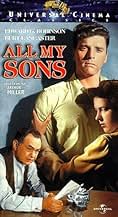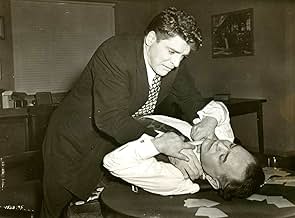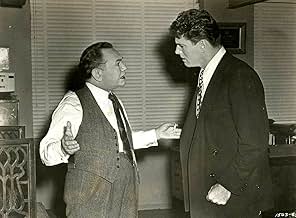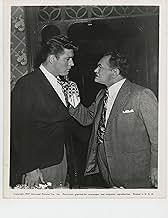IMDb RATING
7.3/10
2.5K
YOUR RATING
During WW2, industrialist Joe Keller commits a crime and frames his business partner Herbert Deever but years later his sin comes back to haunt him when Joe's son plans to marry Deever's dau... Read allDuring WW2, industrialist Joe Keller commits a crime and frames his business partner Herbert Deever but years later his sin comes back to haunt him when Joe's son plans to marry Deever's daughter.During WW2, industrialist Joe Keller commits a crime and frames his business partner Herbert Deever but years later his sin comes back to haunt him when Joe's son plans to marry Deever's daughter.
- Awards
- 2 wins & 2 nominations total
Harry Morgan
- Frank Lubey
- (as Henry Morgan)
Margaret Bert
- Townswoman
- (uncredited)
Walter Bonn
- Jorgenson
- (uncredited)
Helen Brown
- Mrs. Hamilton
- (uncredited)
Pat Flaherty
- Bartender
- (uncredited)
Jack Gargan
- Workman
- (uncredited)
Harry Harvey
- Judge
- (uncredited)
Jerry Hausner
- Halliday
- (uncredited)
Herbert Heywood
- McGraw
- (uncredited)
- Director
- Writers
- All cast & crew
- Production, box office & more at IMDbPro
Featured review
... in that in most noirs you see the dilemma up front in its compexity and completion. And then you watch the protagonist stumble through a series of decisions in which the noose just tightens.
Here the opening scenes are middle class and almost mundane and so post war. A son (Burt Lancaster) has returned from war and is planning to marry the girl of his dead brother, killed in the war. The living son's mother can't deal with the fact that her dead son is indeed dead - he died on an aerial mission and his body was never recovered. And thus she is not very supportive of this prospective union.
But this film turns out not to be about war and remembrance and the new middle class at all. Instead it is about a deed past done, and apparently the perpetrator has gotten away with it, and only as the film wears on are all of the secrets revealed, as well as the real reason the mother cannot accept her son's death.
Edward G. Robinson is terrific as the father who is living the American dream after being set out on the sidewalks by his own family since the age of ten. Lancaster with his beaming smile and his head full of bushy hair would look at home in a collegiate letter jacket, and this is a good early showcase for his talents. Harry Morgan appears in a minor role as one of the fathers of the ongoing baby boom.
I haven't said much here about what is really the conflict in this film, because I don't want to give anything away. However, it is a great film about moral conflict versus friend and family and even patriotic obligations, and it is a shame it is so obscure.
Here the opening scenes are middle class and almost mundane and so post war. A son (Burt Lancaster) has returned from war and is planning to marry the girl of his dead brother, killed in the war. The living son's mother can't deal with the fact that her dead son is indeed dead - he died on an aerial mission and his body was never recovered. And thus she is not very supportive of this prospective union.
But this film turns out not to be about war and remembrance and the new middle class at all. Instead it is about a deed past done, and apparently the perpetrator has gotten away with it, and only as the film wears on are all of the secrets revealed, as well as the real reason the mother cannot accept her son's death.
Edward G. Robinson is terrific as the father who is living the American dream after being set out on the sidewalks by his own family since the age of ten. Lancaster with his beaming smile and his head full of bushy hair would look at home in a collegiate letter jacket, and this is a good early showcase for his talents. Harry Morgan appears in a minor role as one of the fathers of the ongoing baby boom.
I haven't said much here about what is really the conflict in this film, because I don't want to give anything away. However, it is a great film about moral conflict versus friend and family and even patriotic obligations, and it is a shame it is so obscure.
Storyline
Did you know
- TriviaThe original Broadway production of "All My Sons" opened at the Coronet Theater in New York on January 29, 1947. It ran for 328 performances, and won the 1947 Best Play Tony Award for author Arthur Miller. His original script was used as the basis for this movie's screenplay.
- GoofsWhen Joe comes out of the house upon Annie's arrival, he comes down the front steps and walks into the yard with his arms raised. In the next instant, he's back at the steps and his arms are down.
- Quotes
Jim Bayliss: Put her to bed, Joe. Both of you go to bed. Staying up won't help; sleep will. Sleep's a wonderful thing, the best thing about living.
- ConnectionsFeatured in Film Preview: Episode #1.1 (1966)
- How long is All My Sons?Powered by Alexa
Details
- Release date
- Country of origin
- Official sites
- Language
- Also known as
- Svi moji sinovi
- Filming locations
- Santa Rosa, California, USA(the Grace home on McDonald Avenue)
- Production company
- See more company credits at IMDbPro
- Runtime1 hour 34 minutes
- Color
- Aspect ratio
- 1.37 : 1
Contribute to this page
Suggest an edit or add missing content



































